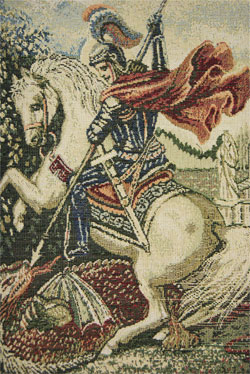|
|
 |
St George was born in 280 AD in a Christian family, in the city of
Capadocia, in Minor Asia. As a young nobleman St
George followed the tradition of the Roman Empire to
join the Roman army. He was a Christian and struggled to spread the Christian
message. When the Emperor
Diocletian in the Roman Empire became aware of St George, he did everything in
his power to destroy him because of his Christian faith. The Emperor
persecuted Christians and destroyed churches.
On 23 February 303 AD, Diocletian
gave orders, which were various
directives in regards to the Christian community, which he had published in
public in a market the day after. For instance, he wanted all the churches
should be torn down, have Christian books burned, have Christian people
deprived of their civil rights. Also to arrest and kill Christian leaders.
When St George saw the propaganda papers of Diocletian, he tore them down into
pieces, in form of a protest. As a result, he was arrested and taken to the
Emperor Diocletian's palace. When he came into the palace of Diocletian, he
tried to talk him out of his conduction towards the Christians. The emperor
tried instead to tempt him with various promises and give him a high position
of power in the kingdom, but St George was not attracted by the promises and
refused to abandon his Christian faith for anyone. Diocletian became angry and
threatened him with pain and torture. It ended up with St George sitting in
jail.
The Emperor knew that nothing except sin could destroy the integrity and life
of St George. But St George was very strong in his faith, in which no trials
of Diocletian could work on him. Regardless of how much St George suffered, he
still tried to spread the true Christian faith further on. Diocletian even
tried to kill St George and thought he was dead several times, but through the
power of the Lord, he came back alive. At one point he even tried to poison
him. Diocletian believed that St George was doing magic since he did not die
of any assassination attempts against him. But it was actually Jesus Christ
who revived him. Diocletian tested St George's strength to revive a close
friend of him and St George prayed to the Lord Jesus and the dead friend came
back to life once again. For all the suffering that he had to go through, St
George never gave up and continued talking to Diocletian about the powers of
the Christian faith.
After all the assassination attempts against St George, the emperor
realized that he could not put an end to his life, so he demanded that he
would be beheaded with a sword. On April 23rd 303
AD St George's life ended at 23 years old. He was buried in his mother's home
who was situated by the beach at Lydda in Palestine. He became a martyr for
the Christian people, since he died for his faith.
King Constantine who then took over after Diocletian claimed that St
George was the true role model for the young Christian man, and asked to have
a church built over his tomb. The Coptic Egyptians call him, "The Prince of
Martyrs" and they have built over 200 churches named after him. The Greeks
call him "The Great Martyr".
An event worthy of attention is St George's fight against the dragon.
This took place when he was stationed in the Roman army near Salone in Libya,
North Africa. The dragon was described as a large crocodile with wings and a
deadly breath. The dragon was placed outside the walls of the city, and no one
could get in or out. The Dragon had also eaten a lot of people around Salone.
Many people fled to the city and searched for shelter behind its walls. At
that time there was a young princess who was about to be sacrificed to the
dragon. St George then decided to kill the dragon on his white horse and
thousands of people were baptized into Christianity after the incident. He
received no pay in cash but instead he asked the king to maintain the churches
and to help the poor. The story is very popular worldwide because of its
spiritual significance of St George defeating the devil through the cross and
His righteousness in Christ.
Historians recognize that St George is a true hero who dared to challenge
Diocletian. He held his spirit pure and untouched until death. He converted
many into true Christian doctrine. On
April 23rd of each year,
the day of St George is celebrated as a great feast in many churches
worldwide.
By: Helen Jakoub
Translated by: Issa Gabriel
Sources: